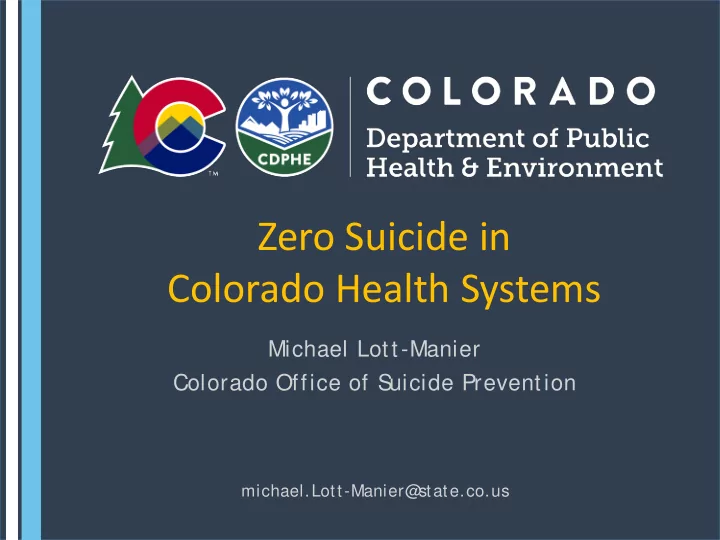

Zero Suicide in Colorado Health Systems Michael Lott-Manier Colorado Office of S uicide Prevention michael.Lott-Manier@ state.co.us
Colorado Office of Suicide Prevention Mission: To serve as the lead entity for statewide suicide prevention and intervention efforts, collaborating with Colorado communities to reduce the number of suicide deaths and attempts in the state. • OS P Activities - S uicide Prevention Commission (S B14-088) - Community Grant Making - Man Therapy www.mantherapy.org - Zero S uicide (S B16-147) - S AMHS A Zero S uicide Grant - Follow-Up Proj ect - Hospital Initiative (HB12-1140) - Gun S hop Proj ect - Public information and education - S chool grants (S B18-272) - S AMHS A GLS grant to expand youth (ages 10-24) suicide prevention efforts - Colorado-National Collaborative
Colorado Data In 2017 there were: 55 HIV deaths 279 Homicides 672 Motor vehicle deaths 638 Breast cancer deaths 576 Influenza & Pneumonia deaths 1,017 Diabetes deaths 1,175 Deaths by Suicide Source: Colorado Violent Death Reporting System
Colorado Data: Age and Gender Source: Colorado Violent Death Reporting System
Colorado Data: Race and Ethnicity Age-adjusted suicide rates per 100,000 population by race/ethnicity, Colorado residents, 2011-2015 25 21.4 20 15 11.5 10.8 9.4 9.3 10 5 0 White, non- Hispanic Black Asian/Pacific American Hispanic Islander Indian Source: Colorado Violent Death Reporting System
Colorado Data: Circumstances 34% Contributing physical health problem Source: Colorado Violent Death Reporting System
2018 CDC Vital Signs Report
Error Reduction for Suicide Prevention Hazards and Crashes (not “accidents”) James Reason: pathways • between hazards and accidents full of “Swiss cheese” attempts at prevention • Screening • Safety planning • Treating suicidality • Continuity of care Following Up • • Continuous improvement
Zero Suicide Background • Based on successful example of 75% reduction in suicide deaths in Henry Ford Health System in Detroit • Demonstrated 35% reduction in suicide deaths in Centerstone Mental Health (FL, IL, IN, KY, TN) after 3 years of Zero Suicide implementation • Adopted by the National Action Alliance in its prevention strategy Suicide Deaths per 100,000 members of Henry Ford Health System HMO 150 100 50 0 1998 1999 2000 2001 2002 2003 2004 2005 2006 2007 2008 2009 2010 2011 Series 1 Sources: Zero Suicide Institute
Zero Suicide Background • Successful when implemented comprehensively health care service delivery systems • Committed leadership drives a process of culture change • Workforce is empowered with training and targeted support • Leadership buy-in and culture change are essential Pre-Zero Suicide Perspective Culture Change Perspective Suicide is inevitable Suicide deaths are preventable Assigning Blame Recognizing nuance of individual’s ambivalence, resilience, and recovery Risk assessment and mitigation Collaborative safety and treatment planning Referring to specialized “go-to” clinicians Part of everyone’s job Individual judgment and actions Institutionalized policies and procedures Hospitalization during a crisis is standard High-quality interactions throughout care continuum “If we can save one life…” “How many deaths are acceptable?” Source: National Action Alliance
Zero Suicide Framework • Transforming systems of care to reduce errors and improve safety • Include people with experience as patients in the health system as leaders • Screen patients, assess for risk, develop collaborative care plans • Transition between care settings • Focus on continuous improvement shaped by real-time data Confident, Competent Workforce Continuous Quality Improvement Safety-Oriented Culture Continuing Identify contact and assess and care risk Deliver evidence-based care Leadership of People with Lived Experience
Hospital Follow-Up Project • The Follow-Up Proj ect provides telephonic follow-up services for patients after discharge from an ED visit for suicide attempts, evaluation, or suicide-related inpatient stay. • Post-vention approach • CO Crisis S ervices hotline • Collaboration & safety focus • Promote access to care • Model ED suicide follow-up • Collect data about attempts
Hospital Follow-Up Project
Zero Suicide Learning Collaborative • Monthly Learning Collaborative calls • Part of OS P contract with EDC • Chance to hear from national experts and share experiences • S ample topics: data definitions and tracking, peer services, community partnerships, celebrating successes • Opportunity for field-building and prevention of burnout and quality improvement fatigue • Contact Michael to participate
Colorado Crisis Services • Crisis Line: 1-844-493-8255 • 24/ 7 walk-in clinics • Respite care facilities • Acute care units • Mobile crisis teams • Crisis Line with peer support and follow up • S ervices available regardless of county, region, or insurance Denver Metro Locations: - 2551 W 84th Avenue 4353 E. Colfax Avenue Westminster, CO 80031 Denver, CO 80220 - 6509 S . S anta Fe Drive 12055 W. 2nd Place Littleton, CO 80120 Lakewood, CO 80228 - 2206 Victor S treet 3180 Airport Road Aurora, CO 80045 Boulder, CO 80301
Other Colorado Resources Office of Suicide Prevention www.coosp.org Colorado Crisis Services 1-844-493-8255 Second Wind Fund www.thesecondwindfund.org Mental Health First Aid www.mhfaco.org One Colorado www.one-colorado.org
National Resources • National Suicide Prevention Lifeline: 1-800-273-8255; www.suicidepreventionlifeline.org • Suicide Prevention Resource Center: www.sprc.org • American Foundation for Suicide Prevention: www.afsp.org • Trevor Project (LGBTQ+ youth): 1-866-488-7386; www.trevorproject.org • Crisis Text Line: 741-741; www.crisistextline.org • Zero Suicide Initiative: www.zerosuicide.sprc.org • Live Through This: livethroughthis.org • Now Matters Now: www.nowmattersnow.org
Questions? Michael.Lott-Manier@ state.co.us 303.691.4081
Recommend
More recommend